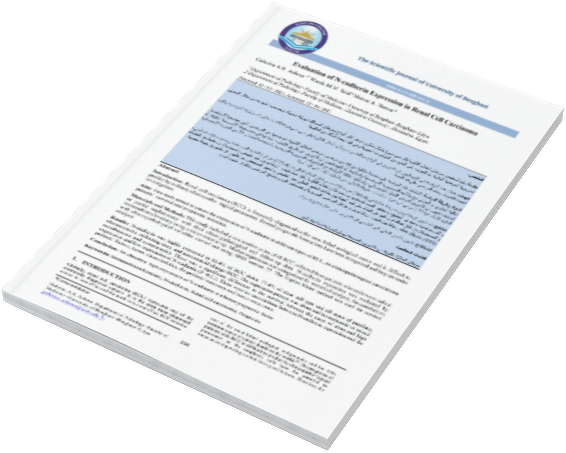Evaluation of N-cadherin Expression in Renal Cell Carcinoma
DOI:
https://doi.org/10.37376/sjuob.v34i1.159Keywords:
Prognosis, Renal cell carcinoma, N-cadherin, ImmunohistochemistryAbstract
Introduction: Renal cell carcinoma (RCC) is frequently diagnosed as the most lethal urological cancer and is difficult to predict by ordinary clinicopatho¬logical parameters. Several prognostic biomarkers have been recognized and they are under investigation.
Aim: This study aimed to assess the expression of N-cadherin in different types of RCC, its clinicopathological associations, patients` survival and prognostic inference.
Materials and Methods: This study included a consecutive series of 48 RCC collected from patients who underwent radical or partial nephrectomy with their clinicopathological and follow-up data. N-cadherin expression was evaluated by immunohistochemistry using a tissue microarray. Marker expression was categorized for statistical analysis, the correlations with clinicopathological variables carried out using SPSS version 22. The Kaplan-Meier method was used for survival analysis.
Results: N-cadherin was highly expressed in 85.4% of RCC cases; 77.4% of clear cell type and all cases of papillary, chromophobe, collecting duct, and sarcomatoid change RCC. The expression pattern was abnormal (cytoplasmic or mixed membranous and cytoplasmic). There was a significant difference in the survival between the cases of abnormal high expression and low expression of N-cadherin (P=0.01). There were no associations between N‐cadherin expression and the patients' factors, tumor characteristics, the patients' outcomes and tumor recurrence.
Conclusion: An abnormal high expression of N-cadherin is a better prognostic factor.
Downloads

Downloads
Published
How to Cite
Issue
Section
License

This work is licensed under a Creative Commons Attribution-NonCommercial-NoDerivatives 4.0 International License.















